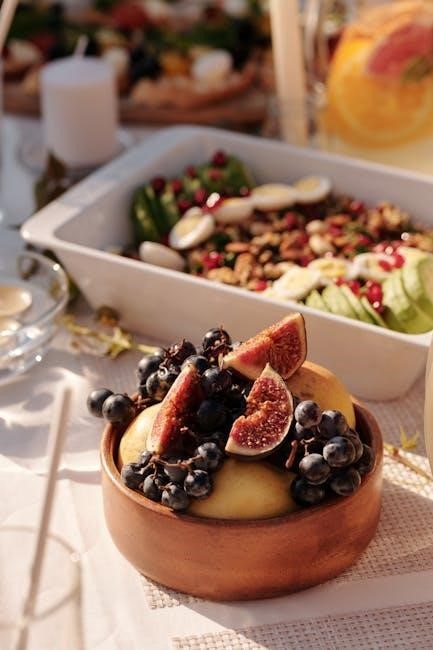The alkaline diet focuses on promoting a healthy pH balance by emphasizing alkaline-rich foods. A 7-day meal plan helps transition to this lifestyle‚ boosting energy and well-being.
What is the Alkaline Diet?
The alkaline diet focuses on consuming foods that promote a healthy pH balance in the body. It emphasizes fruits‚ vegetables‚ and plant-based foods while reducing acidic foods like meat and processed items. Proponents believe this helps reduce inflammation‚ improve digestion‚ and support overall well-being. The diet encourages hydration and the inclusion of nutrient-rich foods to create an alkaline environment‚ potentially aiding in disease prevention and detoxification. Consult a healthcare professional before starting‚ especially regarding high oxalate foods.
Benefits of an Alkaline Diet
The alkaline diet is believed to reduce inflammation‚ improve digestion‚ and boost energy levels. It supports detoxification and may enhance nutrient absorption. By focusing on whole‚ nutrient-rich foods‚ it promotes overall well-being and can help maintain a healthy weight. Many followers report improved skin health and reduced acidity-related symptoms. While some benefits are anecdotal‚ adhering to the diet may contribute to long-term health improvements and a balanced lifestyle.
Key Principles of the Alkaline Diet
The alkaline diet focuses on balancing the body’s pH levels by consuming alkaline-rich foods. It emphasizes fresh fruits‚ vegetables‚ nuts‚ and whole grains while minimizing acidic foods like meat‚ dairy‚ and processed items. Hydration with alkaline water is encouraged. The diet promotes reducing inflammation and supports detoxification by prioritizing plant-based‚ nutrient-dense foods over refined or high-sugar options. Portion control and mindful eating are also central to maintaining balance and achieving optimal health outcomes.

7-Day Alkaline Meal Plan Overview
A structured 7-day plan focusing on alkaline-rich foods like fruits‚ vegetables‚ and whole grains‚ designed to help transition to a balanced‚ health-promoting lifestyle effortlessly.
Why a 7-Day Plan?
A 7-day alkaline meal plan provides a manageable trial period to assess its benefits on your well-being. It introduces alkaline-rich foods‚ helping you transition smoothly to a healthier lifestyle. This structured approach ensures variety and balance‚ making it easier to adopt long-term dietary changes. By focusing on whole foods and avoiding processed items‚ you can experience improved energy and digestion within a week‚ setting a strong foundation for continued success.
How to Prepare for the Plan
Start by clearing your pantry of acidic foods and restocking with alkaline-rich options. Plan your meals and snacks for the week to avoid last-minute decisions. Create a shopping list featuring fresh vegetables‚ fruits‚ and healthy proteins. Stay hydrated and consider gradually introducing alkaline foods to ease the transition. Commitment and preparation are key to maximizing the benefits of your 7-day alkaline journey for improved well-being.
Important Foods to Include
Fresh vegetables like spinach‚ broccoli‚ and cucumbers are essential‚ as they are rich in alkaline-forming minerals. Incorporate fruits such as lemons‚ limes‚ and grapefruits‚ which promote pH balance. Nuts like almonds and seeds‚ including chia and flax‚ are also key. Whole grains like quinoa and brown rice support alkalinity. Healthy fats like olive oil and avocados‚ along with green tea and herbal infusions‚ are beneficial. These foods help maintain a balanced diet and enhance overall well-being.
Foods to Avoid
Avoid processed foods‚ sugary snacks‚ and refined grains‚ as they disrupt pH balance. Limit dairy‚ meat‚ and alcohol‚ which are acid-forming. Reduce intake of caffeine and carbonated beverages‚ as they can lower alkalinity. Avoid foods high in sodium and saturated fats‚ which hinder detoxification. By eliminating these‚ the body can better maintain its natural alkaline state‚ supporting overall health and energy levels throughout the 7-day plan.

Day 1: Starting Your Alkaline Journey
Begin with nutrient-rich breakfasts‚ balanced lunches‚ and cleansing dinners. Incorporate alkaline smoothies and hydrating snacks to kickstart your pH balance and energize your body naturally today.
Breakfast Options
Start your day with alkaline-rich smoothies made from spinach‚ kale‚ cucumber‚ and almond milk. Add chia seeds for extra fiber and nutrition. Green juices with celery‚ apple‚ and ginger also hydrate and energize. Incorporate fresh fruits like berries‚ bananas‚ or citrus for natural sweetness and vitamins. Avoid processed foods and opt for whole‚ plant-based ingredients to set a healthy tone for your alkaline journey.
Lunch Ideas
Enjoy fresh alkaline salads with mixed greens‚ cucumbers‚ and avocado‚ dressed with olive oil and lemon juice. Incorporate plant-based proteins like chickpeas or quinoa for variety. Try vegetable wraps using collard green leaves as wraps‚ filled with hummus and sliced veggies. Grilled or steamed vegetables like zucchini‚ bell peppers‚ and broccoli are also excellent options. Pair meals with a side of fresh fruit or a green juice for added hydration and nutrients.
Dinner Recipes
Alkaline dinners focus on hearty‚ plant-based meals. Try vegetable stir-fries with tofu‚ served over quinoa or brown rice. Grilled or roasted alkaline vegetables like asparagus‚ Brussels sprouts‚ and sweet potatoes are delicious options. Consider lentil or vegetable curries with turmeric and coconut milk for flavor. Stuffed bell peppers with quinoa‚ spinach‚ and herbs also make a satisfying meal. Pair dinners with a side of steamed greens or a fresh salad for optimal balance and nutrition.
Snacks and Drinks
Snacks and drinks play a key role in maintaining alkalinity. Opt for fresh fruits like berries‚ apples‚ or citrus‚ and raw vegetables such as carrots or cucumbers. Nuts like almonds and walnuts are great alkaline options. Stay hydrated with water‚ herbal teas‚ or coconut water. Consider green juices made from spinach‚ kale‚ and lemon for a nutrient-packed drink. Avoid sugary beverages and opt for natural‚ pH-balancing choices to support your body’s health and energy levels throughout the day.

Day 2: Balancing Your pH Levels
Focus on alkaline-rich foods like fresh vegetables‚ fruits‚ and whole grains to stabilize your body’s pH levels. Incorporate hydrating drinks and nutrient-dense meals for optimal balance and energy.
Morning Meals
Start your day with alkaline-rich breakfasts like green smoothies‚ chia pudding‚ or vegetable omelettes. These options provide sustained energy and help balance your body’s pH levels naturally. Incorporate fresh fruits and nuts for added nutrition. Hydrate with lemon water or herbal tea to kickstart digestion and maintain alkalinity throughout the morning. These meals set a strong foundation for a day of balanced eating and overall well-being.
Midday Meals
Midday meals should focus on alkaline-promoting foods like salads‚ steamed vegetables‚ and lean proteins. Quinoa salad with fresh herbs or a vegetable wrap with avocado are excellent options. Incorporate leafy greens‚ cucumbers‚ and bell peppers for hydration and pH balance. Avoid processed foods and opt for whole‚ nutrient-dense ingredients to maintain energy and support overall well-being throughout the day. These meals are designed to keep you satisfied and aligned with your alkaline goals.
Evening Meals
Evening meals should be balanced and light‚ focusing on alkaline-rich foods like steamed vegetables‚ lean proteins‚ and whole grains. Grilled fish with asparagus or a vegetable stir-fry with tofu are ideal options. Incorporate foods like spinach‚ mushrooms‚ and bell peppers to enhance alkalinity. Avoid heavy or processed foods to promote better digestion and maintain pH balance. These meals are designed to nourish your body while supporting your alkaline diet goals.
Healthy Snacking
Healthy snacking is essential for maintaining energy and pH balance. Opt for alkaline-forming foods like fresh berries‚ citrus fruits‚ and raw vegetables. Nuts and seeds‚ such as almonds and pumpkin seeds‚ are also great choices. Incorporate hydration with herbal teas or water with lemon slices. Avoid processed snacks and sugars to keep your body in balance. These snacks support your alkaline diet goals and provide essential nutrients for overall well-being throughout the day.

Day 3: Boosting Alkalinity
Focus on nutrient-rich meals to enhance alkalinity. Incorporate leafy greens‚ citrus fruits‚ and hydrating foods. Avoid processed items and prioritize whole‚ natural ingredients for optimal balance and energy.
Nutrient-Rich Breakfasts
Start your day with alkaline-rich options like spinach‚ kale‚ or cucumber smoothies. Incorporate citrus fruits such as lemons or oranges for their detoxifying properties. Add hydrating foods like watermelon or cucumbers to boost pH levels. Avoid processed cereals and opt for whole‚ natural ingredients to support alkalinity and energy. Pair these with herbal teas or fresh vegetable juices for a refreshing and balanced start to your day.
Alkaline Lunch Options
Opt for alkaline-rich salads with leafy greens‚ cucumbers‚ and bell peppers. Include plant-based proteins like tofu or chickpeas for balance. Dressings should be natural‚ such as olive oil and lemon juice. Avoid processed foods and focus on whole‚ uncooked ingredients. Add herbs like parsley or mint for flavor. Pair with veggie sticks or a side of fresh fruit for a refreshing‚ pH-balanced meal. Herbal teas like mint or chamomile complement this option perfectly.
Dinner Ideas
For dinner‚ consider roasted vegetables like asparagus‚ Brussels sprouts‚ and sweet potatoes with a drizzle of olive oil. Pair with quinoa or brown rice for a balanced meal. Grilled tofu or tempeh adds protein‚ seasoned with herbs like turmeric and paprika. Steamed broccoli and cauliflower are excellent additions. Finish with a side of sautéed spinach and garlic for a nutrient-packed option. Herbal teas like chamomile or peppermint complement the meal perfectly.
Snacks for pH Balance
Alkaline snacks like cucumber slices with hummus or fresh fruit maintain pH balance. Almonds‚ pumpkin seeds‚ and celery sticks with almond butter are great options. These snacks are nutrient-dense‚ support hydration‚ and provide sustained energy. Incorporate them between meals to keep your body in an alkaline state while satisfying cravings healthily.

Day 4: Sustaining Energy
Day 4 focuses on energy-sustaining meals‚ combining nutrient-rich breakfasts‚ balanced lunches‚ and nourishing dinners with alkaline snacks to maintain vitality throughout the day.
Energy-Boosting Breakfasts
Start your day with alkaline-rich breakfasts like green smoothies‚ chia pudding‚ or avocado toast. These meals provide sustained energy‚ balancing your pH levels and supporting overall health.
Lunch Recipes
Alkaline-rich lunches include vibrant salads with leafy greens‚ cherry tomatoes‚ and cucumber‚ dressed with olive oil. Try veggie wraps with hummus or quinoa bowls with roasted vegetables. These meals balance pH levels‚ support energy‚ and promote overall well-being‚ keeping you nourished and focused throughout the day.
Dinner Meals
Alkaline dinners focus on nutrient-dense‚ pH-balancing dishes. Try vegetable stir-fries with turmeric and ginger‚ grilled fish with lemon‚ or hearty salads with mixed greens and herbs. Incorporate alkaline-rich ingredients like spinach‚ zucchini‚ and bell peppers. These meals support pH balance‚ aid digestion‚ and provide sustained energy‚ ensuring a restful evening and a refreshed start to the next day.
Snacks for Energy

Alkaline snacks like fresh fruits‚ nuts‚ and veggie sticks provide quick energy boosts. Opt for options like almonds‚ kale chips‚ or cucumber slices. These snacks are rich in vitamins‚ minerals‚ and antioxidants‚ supporting pH balance and vitality. Incorporate herbal teas or coconut water for hydration. Avoid processed snacks and choose whole‚ nutrient-dense foods to maintain energy levels throughout the day while adhering to your alkaline lifestyle.

Day 5: Enhancing Digestion
Day 5 focuses on enhancing digestion with alkaline-friendly meals. Enjoy digestive-friendly breakfasts‚ light lunches‚ and gentle dinners. Include snacks like smoothies and herbal teas‚ avoiding processed foods to support gut health and overall well-being.
Digestion-Friendly Breakfasts
Start your day with gentle‚ alkaline-rich options like chia pudding with almond milk and berries or a green smoothie with spinach‚ banana‚ and flaxseeds. Oatmeal with sliced almonds and a hint of cinnamon is also an excellent choice. Incorporate herbal teas‚ such as ginger or peppermint‚ to soothe the stomach and support digestion. Avoid heavy or processed foods to maintain a balanced pH and promote digestive health throughout the day.
Lunch Options
Enjoy a vibrant quinoa salad with roasted vegetables like bell peppers‚ zucchini‚ and cherry tomatoes‚ dressed with olive oil and lemon. Alternatively‚ opt for a hearty kale and avocado wrap with alkaline-rich hummus. Steamed green beans or a refreshing cucumber and mint soup are also excellent choices. Pair your meal with a glass of herbal tea‚ such as chamomile or dandelion‚ to support digestion and maintain pH balance throughout the day.
Conclude your day with a nutritious vegetable stir-fry‚ featuring alkaline-rich greens like spinach and kale‚ paired with bell peppers and zucchini. Use olive oil and lemon juice for dressing. Alternatively‚ try a hearty lentil or vegetable soup with quinoa for added protein. Grilled portobello mushrooms or a roasted vegetable medley with sweet potatoes and Brussels sprouts are also excellent options. Pair your meal with a glass of herbal tea to support digestion and pH balance.
Snacks for Digestive Health
Opt for snacks that promote gut health‚ such as cucumbers‚ celery‚ and carrots with hummus; Sliced avocado or a small serving of sauerkraut can aid digestion. Fresh fruits like apples or berries are also excellent choices‚ providing fiber and antioxidants. Herbal teas‚ such as peppermint or ginger‚ can support digestive balance. Ensure snacks are free from processed ingredients to maintain alkalinity and overall well-being throughout the day.

Day 6: Increasing Alkaline Intake
Focus on alkaline-rich foods like spinach‚ kale‚ and citrus fruits to enhance your body’s pH balance and support overall health naturally and effectively every day.
Alkaline-Rich Breakfasts
Start your day with alkaline-rich options like spinach and avocado omelets‚ chia pudding‚ or green smoothies. Incorporate citrus fruits and whole grains to maintain pH balance and energize your mornings naturally. These meals are packed with nutrients and help kickstart digestion‚ setting a healthy tone for the rest of your day. Opt for fresh‚ organic ingredients to maximize benefits and flavor.
Incorporate alkaline-rich ingredients like spinach‚ avocado‚ and quinoa into your midday meals. Try a kale and citrus salad with olive oil dressing or a vegetable wrap with hummus. Grilled tofu or tempeh can add protein to your dishes. Soups‚ such as alkaline minestrone‚ are also great options. These recipes focus on fresh‚ whole foods to support pH balance and provide sustained energy throughout the day.
For dinner‚ opt for alkaline-rich dishes like vegetable stir-fries with kale‚ spinach‚ and bell peppers‚ served over quinoa or brown rice. Grilled tofu or salmon can be added for protein. Roasted vegetable salads with sweet potatoes and Brussels sprouts‚ drizzled with olive oil and herbs‚ are also ideal. These meals promote a balanced pH while providing essential nutrients for a satisfying and healthy evening option.
Snacks for Alkalinity
Snacks like cucumber‚ carrot sticks‚ or fresh fruit slices are perfect for maintaining alkalinity. Almonds‚ pumpkin seeds‚ and chia seeds also support pH balance. Consider veggie wraps with hummus or a small green smoothie. Opt for fresh‚ whole foods to avoid acidity and keep energy levels steady throughout the day.

Day 7: Finalizing Your Week
Conclude your week with a focus on hydration and nutrient-dense meals. Incorporate leafy greens‚ fresh fruits‚ and alkaline-rich snacks to maintain balance and energize your body.
Breakfast Ideas
Start Day 7 with refreshing alkaline-friendly options like a spinach and mango smoothie or a chia pudding with berries. Try a citrus-herb omelet or avocado toast on whole-grain bread. Incorporate plant-based alternatives like almond milk and nut butter for added nutrition. These meals boost energy‚ support detoxification‚ and maintain pH balance. Pair with a glass of fresh green juice for an extra alkalinity kick to keep you feeling vibrant and focused throughout the morning.
Enjoy a vibrant alkaline salad with leafy greens‚ cherry tomatoes‚ and a citrus vinaigrette. Alternatively‚ try a quinoa and roasted vegetable wrap with hummus. Grilled tofu or tempeh with steamed broccoli and brown rice is another nourishing option. These meals are packed with alkaline-forming ingredients‚ promoting balance and energy. Pair with a refreshing cucumber and mint infused water for hydration and a light‚ revitalizing finish to your midday meal.
Stuffed bell peppers with quinoa‚ spinach‚ and mushrooms make a flavorful alkaline dinner. Alternatively‚ try zucchini noodles with pesto‚ cherry tomatoes‚ and roasted vegetables. Grilled tofu or tempeh with a side of sautéed kale and turmeric-infused brown rice is another option. These recipes focus on alkaline-forming ingredients‚ promoting hydration and pH balance. Pair with a glass of lemon water or herbal tea for a light‚ refreshing finish to your evening meal.
Popular alkaline snacks include fresh fruits like apples or berries‚ trail mix with nuts‚ and veggie sticks with hummus. For drinks‚ herbal teas like chamomile or peppermint are ideal. Lemon water‚ despite its acidity‚ aids digestion and hydration. Incorporate fresh vegetable juices‚ such as cucumber or carrot‚ for added nutrients. These options support pH balance and provide sustained energy throughout the day‚ complementing your meal plan perfectly.
Completing the 7-day alkaline meal plan can lead to improved health and energy. Continuing this lifestyle may enhance long-term well-being. Stay committed and explore further resources.
Maintaining an Alkaline Lifestyle
Maintaining an Alkaline Lifestyle
To sustain an alkaline lifestyle‚ focus on incorporating alkaline-forming foods daily‚ such as fruits‚ vegetables‚ and whole grains. Avoid processed foods and sugary drinks. Stay hydrated with alkaline water and herbal teas. Plan meals in advance to maintain consistency. Gradually introduce new recipes and ingredients to keep your diet diverse. Monitor your body’s pH levels regularly and adjust your choices accordingly. A long-term commitment to this lifestyle can lead to improved health and energy levels over time.
Resources for Further Learning
Explore official dietary guidelines‚ such as the Australian Dietary Guidelines‚ for evidence-based nutrition advice. Websites like www.eatforhealth.gov.au offer practical tips. Consider books on alkaline diets for detailed insights. Join online communities and forums for shared experiences and recipes. Look for reputable sources to avoid misinformation; Always verify claims with scientific research. For a 7-day alkaline meal plan‚ refer to trusted health websites or certified nutritionists for guidance and support.
